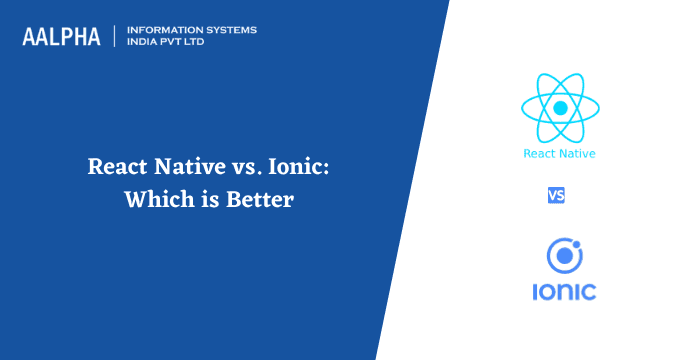React Native vs. Ionic is the main discussion topic when evaluating cross-platform frameworks. Mobile development does not simply mean iOS programming using Swift or Android development using Java. We are creating hybrid, cross-platform, and progressive web applications.
What is React Native
React Native is a cross-platform solution for native iOS and Android mobile applications. React is written in JavaScript. Facebook open-sourced it back in 2015 and has since garnered tremendous popularity.
Using JavaScript and React for iOS and Android, React Native builds native mobile applications.
Check: react native development India
What is Ionic?
Ionic is a hybrid mobile app solution. You can utilize common web technologies like JavaScript, HTML, and CSS to create high-quality cross-platform applications.
The goal is to develop once, and that code can be distributed across iOS, Android, Web, and PC. All platforms share the same codebase.
Check: ionic development company in India
-
Native/hybrid
React Native is native.
React Native is used to creating native cross-platform applications. A native app is a software application developed in a particular programming language for iOS or Android.
It is created using JavaScript and React Native, but it is an entirely native component of iOS and Android. Native iOS applications are in Swift or Objective-C, while native Android apps are in Java. The underlying widgets are entirely native components, providing the user a smooth experience. React Native’s appeal is that it creates native iOS and Android applications with a single code base.
Ionic hybrid
Ionic is hybrid. It utilizes HTML, CSS, and JavaScript to create web, desktop, and mobile applications. Hybrid applications utilize a Web View to create mobile apps.
Ionic applications are based on web technologies and rendered using Web Views. Moreover, ionic applications are developed using web technologies and displayed using Web Views, a full-screen, full-powered browser.
The aim is to reuse code across many platforms. Hybrid applications will not have access to mobile device’s native capabilities out of the box.
-
Stack technology
React Native
The popular framework React Native is built in JavaScript. JSX writes the UI components instead of HTML. JSX appears like any other template language but comes with JavaScript’s capability. React Native utilizes React is because both frameworks were created and open-sourced by Facebook. Therefore it makes sense to use React to construct React Native.
Ionic
Use Angular, Vue, or even React to create Ionic applications. Ionics’s tech stack is more versatile than React Native. With Ionic 4’s newest version, you may utilize Ionic with any web development framework.
-
Learn curve
React Native
If you are a developer, understanding React Native is quite simple. The principles are the same as in React. The main distinction is that React utilizes web components, whereas React Native employs wraps over native iOS and Android components. Moreover, becoming a React Native developer should not take a long time.
Learning React Native involves learning JavaScript and reacting. The learning curve may be regarded as high by someone without an understanding of reaction. You also need to start thinking like a mobile developer, since you are building mobile applications, not web apps.
Ionic
We have seen Ionics’s tech stack adaptable. Use JavaScript, CSS, and HTML together with your web framework choice. It may be Angular, React, Knockout, Vue, or any other contemporary web frame. This implies that developers using Ionic Framework will choose the framework they are already familiar with developing applications. Moreover, the learning curve here is not as high as React Native.
With Ionic, you create online applications that can become mobile apps. Moreover, this hybrid method differs from React Native’s native approach. It is simpler for engineers to understand.
-
Achievement
If you want the greatest performance, coding native applications for iOS and Android is your best option. Native coding gives immediate access to native capabilities when you code. There is no abstraction layer, and direct contact with native iOS and Android components increases speed. React Native and Ionic cannot match native performance. Nevertheless, let us look at who is better.
React Native
React Native is closer to Ionics’s native performance. React Native builds native applications using JavaScript. It looks like a native app and utilizes the same building elements that native applications do. The main difference is that it is cross-platform, using JavaScript to wrap around these native building pieces. React Native gives mobile applications excellent performance and responsiveness.
Ionic
Ionic, however, is a mixed approach. It does not create native applications; therefore, performance problems may arise. The native code has several callbacks, which may cause latency. Ionic also needs the Cordova plugin to access native functionalities. Although Ionic is a fantastic option to create beautiful UI and quicker development than frameworks like React Native. Moreover, it comes with certain performance problems.
Wrapping Up
Naturally, the “correct” structure never exists. When planning to create cross-platform applications, make sure you analyze your use cases and developer preferences to determine which framework to choose.
Both React Native and Ionic come with advantages and disadvantages, and it requires a thorough assessment to choose one for development.
Any queries about cross-platform development? Contact mobile app development company!
Also check: React Native vs Swift | React Native vs Flutter: Best Cross-Platform


